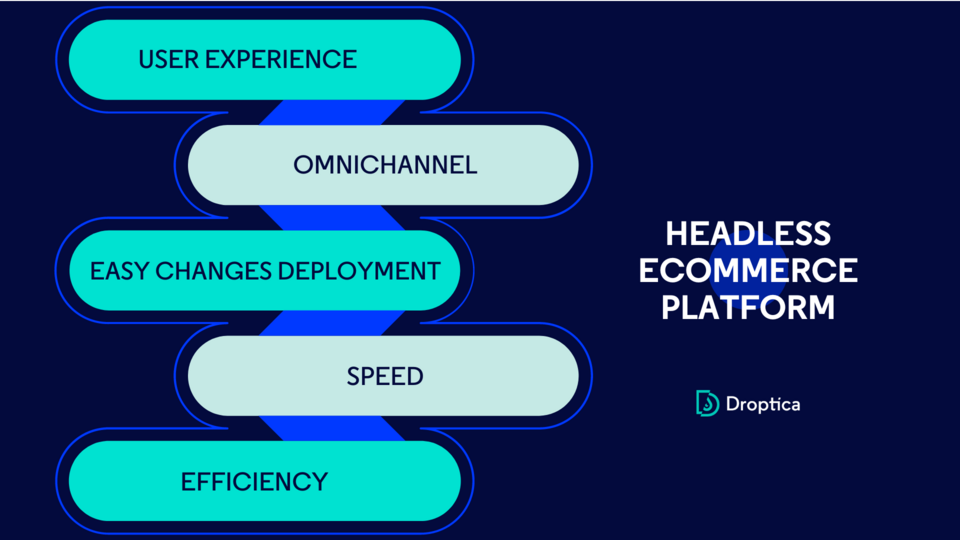
What is a Headless Ecommerce Platform? Overview and Example
Today the Internet has become a significant place for widespread sales. The increase in demand for ecommerce services directly translates into the rapid development of this technology. What was standard just ten years ago may already be obsolete and inadequate under rushing progress. In this article, we will present one possible path that can be taken when building an ecommerce platform and the benefits of the headless approach.
What is a headless ecommerce platform?
A headless ecommerce platform is an advanced web-based tool that enables selling products online. “Headless” means that the content presentation (frontend) and business logic (backend) are separated from each other, giving greater flexibility and scalability for online stores.
Compared to headless CMS, which also splits the frontend from the backend, the headless ecommerce platform focuses solely on selling products. Headless CMS allows content management across different platforms, such as websites, mobile apps, and IoT (Internet of Things) devices. Headless ecommerce, on the other hand, focuses on offering a complete solution for online stores, enabling management of the product catalog, order process, payments, and other aspects related to online sales.
In the case of the headless ecommerce platform, we decide what our online store should look like, what features it should have, and how it should work, using any frontend tools such as React, Vue.js or Angular. This allows us to create unique and customized user interfaces, which in turn translates into a better shopping experience for our customers.
Headless ecommerce and traditional ecommerce – differences
Headless ecommerce and traditional platforms differ in many ways. Here are five aspects where we can observe these distinctions.
Architecture
The main difference between a headless and a traditional ecommerce solution is the architecture. In the latter case, the frontend (user interface) and the backend (business logic) are strongly connected and integrated into a single system. Headless ecommerce, on the other hand, separates the frontend from the backend, making them independent of each other. The frontend uses an API (application programming interface) to retrieve data from the backend, which translates into greater flexibility.
Frontend
Headless ecommerce enables more advanced platform personalization than traditional ecommerce. By separating the frontend from the backend, the user interface and customer experience can be customized more precisely. Since we’re responsible for creating the application frontend ourselves, here we’re in no way blocked or limited by top-down configuration options of skins or templates (which is standard in classic CMS systems). We can also more easily customize interactions across devices and channels.
Scalability
The headless ecommerce platform is also characterized by greater flexibility and scalability. Since the frontend and backend are separate, they can be developed and scaled independently of each other. We can easily add new features (such as a section with related products, advanced product filtering, or whatever the developers write) or make changes to the visual aspect of the website without affecting the business logic, and vice versa. This allows us to implement changes faster and adapt to changing market needs while minimizing the risks that come with implementing the entire application each time.
External integrations
Headless ecommerce facilitates integration with various external systems and tools. Since the frontend uses APIs to communicate with the backend, we can easily connect the platform with CRM (Customer Relationship Management) and ERP (Enterprise Resource Planning) systems, payment systems, marketing tools, etc. This enables us to create more integrated and optimized business processes.
Advantages of headless ecommerce platforms
Headless ecommerce technology brings many advantages that, while achievable in classic platforms, have never been so simple and affordable. Here are some examples of the benefits:

- User experience: headless platforms enable more advanced personalization, resulting in a better user experience. Thanks to this solution architecture, custom user interfaces can be created, tailoring the online store's content to the target audience, and presenting personalized offers and recommendations. This allows us to match customer preferences and needs better, resulting in higher conversion rates and loyalty.
- Omnichannel: headless ecommerce enables us to easily adapt our offers to different sales channels, such as social networks, mobile apps, websites, and marketplaces. Thanks to APIs, such a solution can also integrate with various tools (e.g., marketing automation platforms) and third-party systems (e.g., payment gateways),
- Easy changes deployment and scalability: headless ecommerce platforms provide the option to make changes quickly. A separate frontend and backend allow us to develop and scale both layers independently. We can easily add new features, perform updates, test different strategies, and experiment without disrupting the entire system. This translates into greater innovation and the ability to adapt to dynamic market needs.
- Speed and efficiency: headless ecommerce is a very efficient solution. Since the frontend is not burdened with business logic and data processing, it can run lighter and faster. In addition, by scaling the frontend and backend separatly, the performance of both layers can be optimized independently of each other, resulting in faster page loads, lower response times, and a better user experience.
Sylius - modern headless ecommerce platform
The popularity of headless architecture in the market can be evidenced by the number of new solutions based on it. Among the many such products is Sylius - an ecommerce system. Let's take a closer look at this platform.
Sylius - ecommerce
Sylius is a flexible and robust ecommerce platform based on the Symfony framework. It was created as open source software, which means it’s publicly available and can be developed by the programmers' community.
The main idea behind Sylius is to provide a modular and scalable structure for online stores. Thus, users can customize the platform to meet their individual needs and requirements without having to modify the original code. Sylius offers several pre-built modules and extensions that allow users to add new functionality, such as payments, shipping, order management, shopping cart, and more.
Sylius itself is also built on a modular architecture, which means it can be customized for different industries and complex business scenarios. Thanks to Symfony, Sylius uses proven and robust development tools, making it easy to develop and maintain applications.

Mom O'clock - marketplace built on Sylius by Droptica team.
Sylius also has a user-friendly interface that makes it easy to manage an online store. It gives us the ability to customize the appearance and layout of website and offers tools for data analysis, order tracking, and product management.
This platform is one of the popular options for companies that want to create and run advanced online stores. Its flexibility, scalability, and developer community’s support make it a valuable tool for ecommerce.
Sylius - headless ecommerce
Open Source Headless eCommerce Platform - with these words, Sylius advertises itself as a headless platform. Let's find out what it looks like in practice.
With a headless approach, Sylius can be operated as a backend to handle ecommerce functionality, such as managing products, shopping carts, orders, and payments. Instead of using the off-the-shelf Sylius frontend, we can create a separate user interface with, e.g., React, Angular, Vue.js, or another interface-building tool.
What are the benefits of using Sylius as a headless platform?
- We can freely design and develop the user interface, without the limitations imposed by pre-made templates or Sylius layouts.
- We can freely customize the user experience to meet our target audience's and industry's requirements creating a user interface that conforms to our vision.
- With Sylius, we can develop and expand the online store without affecting our business logic.
- Thanks to the availability of APIs, we can integrate with external systems such as payments, warehouses, or CRM systems.
- We can take special care of our online store safety. Sylius is based on the Symfony framework, which provides robust security and development practices.
As a headless platform, Sylius offers flexibility, personalization, and scalability, allowing us to create custom ecommerce user interfaces. If we have experience building frontends and want to control the appearance and behavior of the online store fully, Sylius headless may be the right choice.
It’s also worth mentioning here the development plans of Sylius. With version 2.0, the architects of the solution plan to completely detach the frontend from the store logic and probably, in time, omit it altogether. This shows the trend that the industry is following, "forcing" users, as it were, to take care of building the frontend entirely on their own.
Although moving away from the option of choosing skins or templates for an online store may seem like a rather radical decision, it may benefit the product itself, as its developers will be able to focus on what is most important in this case, i.e., the store logic and administrative tools.
What functionalities for ecommerce Sylius offers?
Sylius offers a wide range of functionality for ecommerce, which is essential for successful online store management. Here are some of the main options available on this platform:
- Product management: Sylius allows us to create, edit and manage products. We can define attributes, categories, variants, images, descriptions, and other product details.
- Shopping cart and orders: the platform provides a shopping cart mechanism that enables customers to add products, calculate delivery costs, apply discount codes, and place orders. We can manage orders, their statuses, payments, and shipping.
- Payment system: Sylius supports various payment methods, such as credit cards, bank transfers, electronic payments, and other popular payment gateways. We can easily configure and integrate our preferred payment methods. To start, we have traditional transfer, pay-on delivery, and PayPal Express checkout available. We can easily install additional ones like Stripe, PayU as a plugin or bundle.
- Customer management: in the tool, we can create customer accounts, collect customer information, and manage purchase history and preferences. Sylius also offers the ability to handle registration, login, and password reset for customers.
- Promotions and discounts: this open source platform allows us to create various types of promotions and discounts, such as percentage values, voucher codes, free shipping, etc. We can set rules for promotions and their expiration dates.
- Inventory management: Sylius enables us to track product inventory, manage availability, set quantity limits and make real-time updates.
- Rating and feedback system: We can allow customers to add product ratings and reviews, which can help build trust and make purchasing decisions.
- Reporting and analytics: Sylius offers tools to generate reports, statistics, and analytics to track sales, orders, conversions, customer behavior, and other ecommerce KPIs.
- Multilingual and multicurrency: Sylius supports multiple languages and currencies, enabling international online stores and local customization.
- Extensibility: Sylius is a highly flexible framework that allows us to customize functionality by extending, creating custom modules, and integrating with external systems.
These are just a few of the functionalities offered by Sylius. This software has many additional modules, extensions, and integrations that can enhance its capabilities.
Who would benefit from Sylius ecommerce platform?
Sylius ecommerce can appeal to different users depending on their needs and requirements. Here are some groups for whom this solution may work particularly well.
- Medium and large enterprises: Sylius is a framework that can be easily customized. It provides the ability to build a personalized storefront without needing off-the-shelf solutions, which can attract businesses looking for more control and flexibility. However, it’s important to keep in mind the relatively high entry threshold and the additional costs associated with building the frontend ourselves. The system flexibility is a double-edged weapon. Although it offers virtually unlimited possibilities, it also requires a greater time investment in its implementation.
- Ecommerce developers and agencies: Sylius offers a solid technological foundation based on the Symfony framework, making it an attractive choice for developers and agencies offering ecommerce services. Its extensibility and customization capabilities allow us to create bespoke solutions and tailor them to specific client projects.
- International companies: Sylius offers support for multiple languages and currencies, making it an attractive solution for multinational companies. This allows us to run online stores in different countries, customizing them for local customers.
- Companies using other ecommerce systems: for enterprises that already have an ecommerce system and are looking for an alternative, Sylius can be considered a migration platform. Thanks to its flexibility and extensibility, the solution can adapt to existing infrastructure and integrate with systems.
Headless ecommerce platform - summary
The trend in the ecommerce industry is clear, and we can expect to see more and more systems moving to a headless architecture or being created this way from scratch. As with any new technology, in doing so, it’s essential to keep in mind both the opportunities offered and the risks we may face.
Following this line of thought, headless seems to be an ideal solution for any company that values flexibility and scalability of its business. Still, the need to create its frontend may become an impossible barrier for those who value their time or lack technical skills. In such a situation, it's worth opening yourself up to help from the experts of Sylius or another such ecommerce platform to fully realize its potential in your project.











